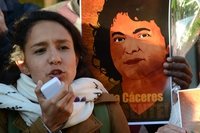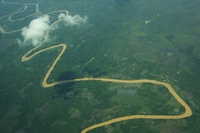
Eriberto Gualinga. My people the Sarayaku’s fight against oil and gas
It has been four years since the Inter-American Court of Human Rights found Ecuador guilty of granting the ancestral land of the Sarayaku in concession to an oil and gas company. The community of about 1,200 indigenous Kichwa people is situated along the Bobonaza River, in the southern part of the Ecuadorian Amazon. In 2012, the Court reaffirmed the right of








